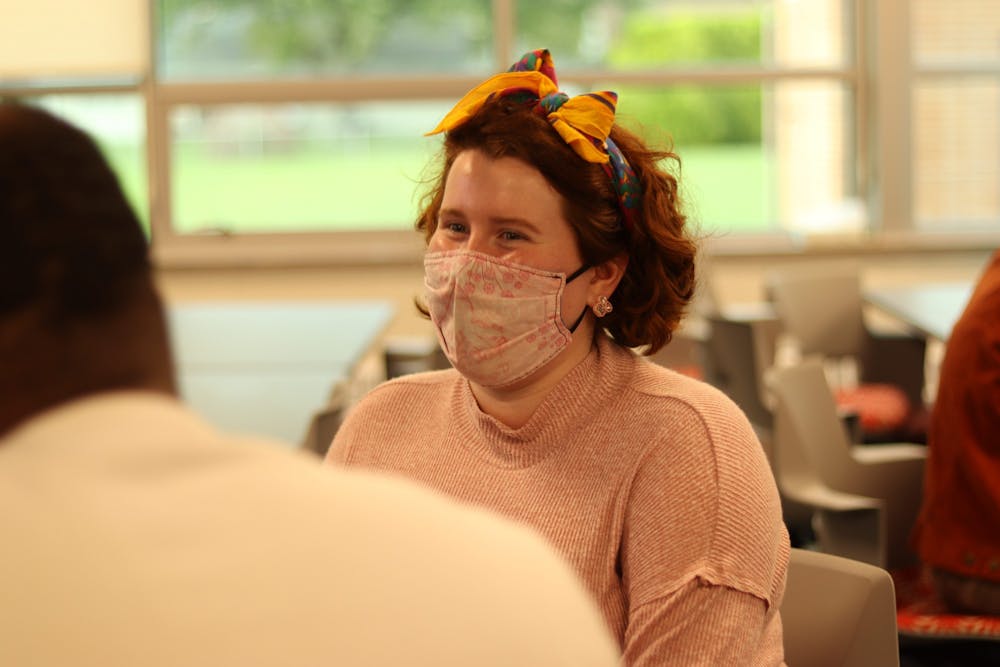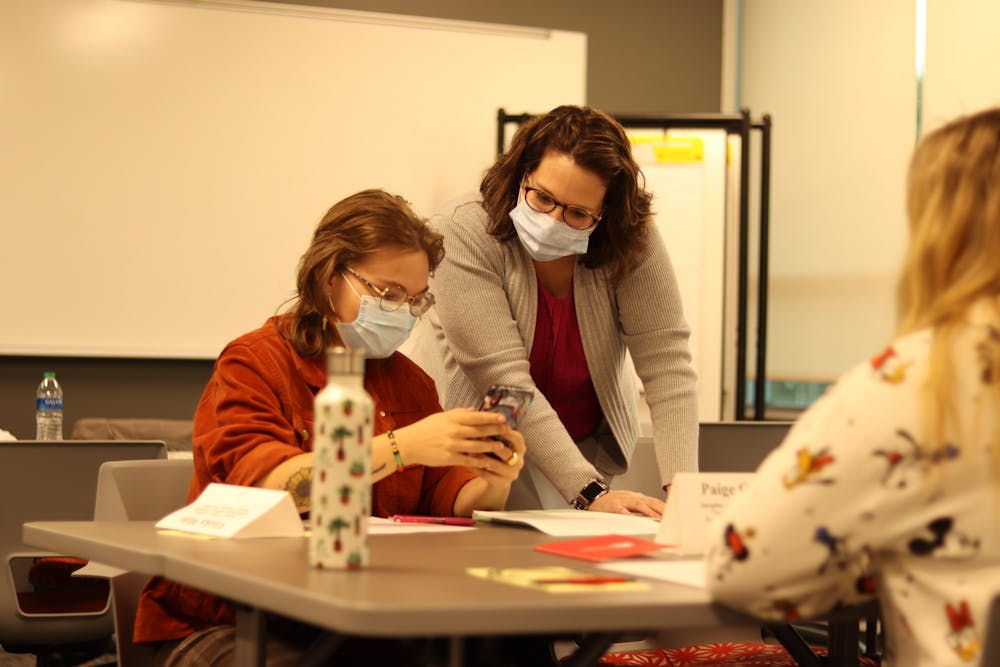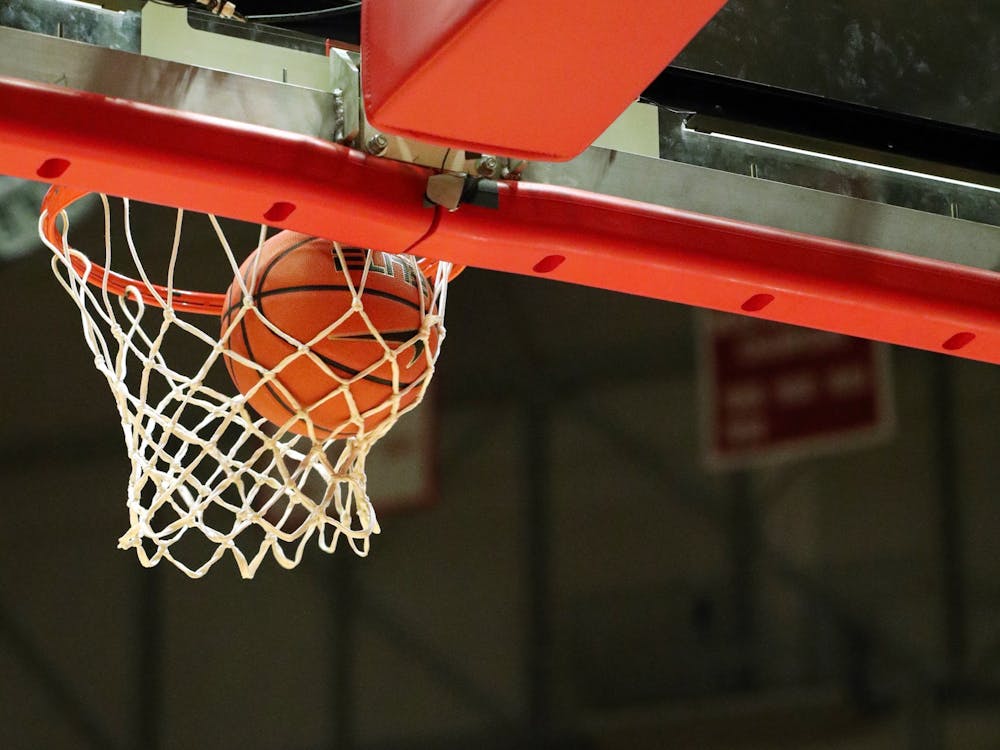With the tap of keys on a keyboard and the click of a mouse, a group of undergraduate and graduate students each pressed “send” on an application. They were chosen from a small pool of applicants after presenting who they are to the lens of a camera and writing a 1,000-word-maximum essay to explain why they should be part of a program that’s never been done before.
There were 10 of them, and they would become “Gen: i.”
Ball State’s Entrepreneurial Leadership Institute recently launched its new year-long program, “Gen: i,” which takes a deep dive on leadership, discovery and innovation through a mindset of creativity and entrepreneurship, said Charity Coffman, associate program director at the Entrepreneurial Leadership Institute.
The program runs from September to April, and the institute is located on Ball State’s campus in the Oakwood Building, according to the Entrepreneurial Leadership Institute’s website.
“Gen: i” stands for generation innovation, but the “i” also represents the individual innovator in everyone, Coffman said. A big part of the program is “redefin[ing] the traditional sense of entrepreneurship,” according to the website.
“I think that a lot of people really think of entrepreneurship just in the very traditional way of ‘entrepreneurship is starting a business,’ and that is not really what entrepreneurship is,” Coffman said. “It is thinking creatively. It’s thinking about self and others. It’s problem solving — it’s pursuit of opportunity.”
The program has 10 students of different majors, including psychology, nursing and business, Coffman said. There was an application process in the spring 2021 semester, involving a written portion addressing why applicants were interested, their future goals and why they should be chosen, according to the website. The application also included a YouTube video pitch.
Parker Czizek, junior marketing major, said he felt like he had to sell himself to the staff of the Entrepreneurial Leadership Institute with the video pitch.
“[I had to make] sure they know, ‘Hey, I want to be here — I promise,’” he said. “I had a sticky note under my lens of lists of stuff that I wanted to make sure I hit on."
Caleb Sholty, junior human resource management major, said he struggled with the written portion of the application. He said the essay questions “actually made you think.”
“I love writing and everything, but I was definitely sweating when I was writing that paper,” Sholty said.
Along with the essay and video pitch, students were permitted to send other supporting documents or letters of recommendation, according to the Entrepreneurial Leadership Institute website.
Participating in the program costs $975, and the money will go toward personal development assessments, such as tests measuring students’ psychological talents, personalities, leadership, creative talents, innovation and communication styles. Coffman said she will possibly add other assessments for this year’s group depending on how the year goes.
Once in the program, students create a personal mission and vision and also participate in “Lego Serious Play,” an artistic way to visualize business and innovation topics that open up group discussions.
“I’m very excited about [Lego Serious Play]. You learn how to express creativity through Lego,” Coffman said. “Let’s say that you’re talking about ‘What does your ideal leader look like?’... you put it together and you design what your ideal leader looks like. Then, you share that and you talk about it.”
The group meets twice a month, and the program will provide different experiences throughout the year, including a trip to Disney World and the LUME exhibit at Newfields in Indianapolis. Coffman said students are also encouraged to participate in Slack discussions on a weekly basis.
“Gen: i” is built on some of the soft-skills the National Association of Colleges and Employers (NACE) look for,” Coffman said, including communication, critical thinking, knowledge and awareness of inclusivity and leadership.
On Sept. 23, the group had its second meeting of the year, in-person at the institute. With moments of laughter and discussions about their personal lives, students went over their results from the Gallup CliftonStrengths 34 test, which outlines the students’ core strengths and how those strengths present themselves in their lives.

Addison Paul speaks with her partner for the discussion exercise, Eric Williams in the Oakwood Building Sept. 23. "Gen: i" students were reviewing their Gallup Clifton Strengths 34 results and some of their discussion was filled with laughter. Elissa Maudlin, DN
Before this meeting, Czizek said he wanted to learn more about himself through the “Gen: i” program. He said he doesn’t like being too comfortable and uses innovation to learn from his mistakes.
“I’m an only child, and my parents are my best friends, and we promote a lot of collaborative conversations whenever we’re talking,” Cizek said. “Jokes never die — ideas never die. I feel like that gives me a really big upper hand, in a sense of I’m OK with making jokes that don’t make people laugh … I’m OK with being collaborative and opening up to people.”
Sholty said his innovation style is personality-based, meaning he wants to learn about different ways of thinking and behaving with others.
“I’m so used to just thinking, ‘Oh yeah, I know what to do — I’ll be fine,’ things like that, but will I actually be?” Sholty said. “Do I actually know what to do? I think that [creating a personal mission] is a nice little way to confront that.”
Another aspect of Sholty’s innovation style is breaking free from the mindset he has set for himself to see the bigger picture, he said.
“I always like to think that I have myself figured out, and in many ways I do, but I’m definitely looking forward to seeing what other holes I can punch in myself or what other people can do,” Sholty said.
Although “Gen: i” teaches students about themselves, it also teaches them about others and generates awareness for the differences between them and the people in their lives.
“We say ‘personal awareness’ and ‘others’ awareness’ — [the program] just makes you a better contributing member of society,” Coffman said. “‘Person X approaches this completely different than me, but it’s not bad — it’s just different because they see things through a different lens.’ That just gives you a different appreciation for them.”
When it came to meeting other people within the group, Czizek said he was excited to put faces to names.
“I’m a people person at heart,” Czizek said. “I’ve always had best friends — I’ve never had, ‘Oh yeah, they’re my friend.’ Ever since I was younger, it’s just like, OK, they’re all my best friends — we’re all super close here,’” he said. “It’s fresh faces and it’s new people to tell stories to.”
Like Czizek, Sholty said he was excited to get to know people, see how their minds work and how they behave.
“Freshman year is all about meeting new people, doing new things and getting accommodated to those things,” Sholty said. “By the time you’re a junior, you have your routine — you have your groups, you have your organizations, there’s no reason to stray outside of that net…”
Coffman said one of her favorite parts of “Gen: i” is how it brings diverse groups of students together.
“We have just all these different majors that are coming together,” she said. “What a neat network and networking opportunity and a chance to really get diverse thoughts and perspectives that you may not get at any other time in your college career.”
Czizek wants to start his own business and aims to use this program as a leg up for him in his business ventures, but he also wants to make more friends and was looking for like-minded people when he entered the program.
“On the first meeting … I was like, ‘This is it. I think I’ve found the people I’ve been looking for,” he said.
From a student perspective, the mingling of different kinds of people is also something Sholty said is important about “Gen: i.”
“I think [the program just shows] … with the 10 different people that are here … just how easily we can fit together, how we can find that foundation no matter who we are,” Sholty said. “We had one thing in common, and that was the interest in this program … [Now], it's the second meeting, and I know these people on a first-name basis, and we joke as soon as they come in the room.”
As the pilot group, the 10 students going through the program are the first of their kind. For Sholty, he said being the “guinea pigs” allows the students to set the standard for the future of the “Gen: i” program.
“There’s going to be things that we teach [Coffman] about what works in this program, and she’s going to teach us the things that she thinks are important,” Sholty said. “I think it’s just going to be that constant … back and forth, until we finally hit that point where we’re like, ‘Yes, this is what we wanted to learn — we didn’t know it’s what we wanted, but this is what we wanted.’”
Contact Elissa Maudlin with comments at ejmaudlin@bsu.edu or on Twitter @ejmaudlin.





